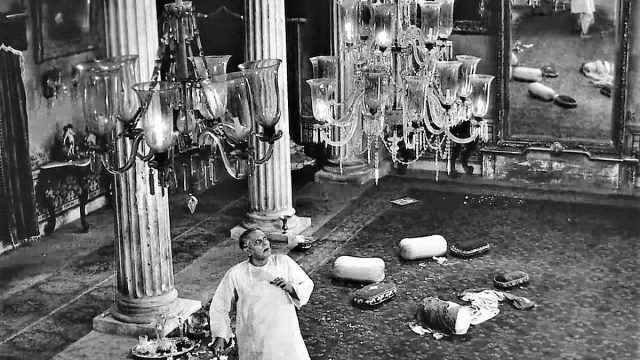It’s fascinating to think of music as an aristocrat’s (or zamindar‘s, as they were referred to in India during this era) vice. But that’s how Satyajit Ray’s script treats it: at one point it literally refers to music as a “vice.” There are a lot of more traditional vices that go along with the music parties that our protagonist Roy throws, like hookah smoking and drinking, but it’s music that Roy can’t get enough of. These music performance parties are also pointless macho-posturing pissing contests with his male neighbors, which makes it even more ironic that he sold his wife’s jewelry to throw one: these music parties are Roy’s version of jewelry. Even his claims that the first party we see is for his son is soon undone by his refusal to accompany his wife and son on their trip that ultimately leads to their deaths because he wanted to throw another party.
(Color me surprised to discover that Satyajit Ray invented “Don’t say goodbye; say see you later”-followed-by-the-death-of-a-son cliché way back in 1958 . Unfortunately as soon as that line was said, I knew what was coming. But it was fascinating the see the first instance of this cliché go without any suspenseful music the way it does today. When the son does die, we don’t have to hear the line of dialogue or see a flashback to the exchange. Ray trusts the audience to remember what happened a half hour ago.)
There are non-substances that we still consider hooks for addiction in present day that remind me of Roy’s music party addiction. My dad is a sex, porn, and love addict for example, which are perfectly fine concepts when consumed in moderation. So when do these non-substance addictions show themselves as such? When do we decide someone is a love addict or a sex addict? Well, usually when it interferes in the addict’s life. It’s the same for Roy’s music party addiction. It’s a problem because Roy’s the last generation of an aristocratic class of zamindars and his fortune is rapidly dwindling. It’s a problem because The Music Room takes place before home electricity was common, so to hear music, Roy has to hire at least one person (and probably many more) to come physically to play music for him. That’s the difference. Would there still be music addicts if we couldn’t just turn on a stereo and had to invest in throwing a party with live performers? Quite possibly! But The Music Room also has a lot of insight into the addicts’ mindset of going cold turkey or indulging until they hit rock bottom. It’s worth noting that Roy’s not just hurting himself even though his wife and son are already dead (which was also his fault). He has two loyal servants who are going down with him who take opposite perspectives. One gets more and more stressed out. The other gets excited to lose himself in his boss’s music parties.
The music performances took a while to grow on me, but I really loved whenever they’d get rhythmic, especially when Roy spots a drowning cricket in his alcohol that seems to be scrambling frantically to the rhythm of the music. This is another way The Music Room foreshadows the death of his son, who we later learned drowned around the same time Roy witnesses the cricket’s drowning. The cricket is also foreshadowing the way Roy’s house is falling into disarray. It isn’t the last insect to make that point.
SPOILERS from here on out:
The next insect to represent Roy’s increasingly dire financial situation takes the form of a spider crawling over his portrait . I love how The Music Room shows Roy’s downfall as his house seems to become increasingly haunted and becomes more and more dilapidated. The way Roy’s ancestors stare down at him from the paintings that adorn the music room reminded me of similar devices in Rebecca and Raise the Red Lantern. The music room is a character in The Music Room.
I loved how after the party, all the lamps started flickering because they were all running out of oil at the same time. Not only did it add to the house’s haunted atmosphere in Roy’s impending downfall, but it also emphasized how complicit he was in that downfall. Obviously if he hadn’t thrown the party that required him to light all the lamps, he could have made that lamp oil go much farther by only using one or two lamps at a time.
I actually would have preferred if The Music Room had ended when those lights went out and Roy ran out of resources. I did like how the servant let the light in the house in the morning to symbolize Roy’s coming out of denial about his situation. I didn’t need him to ride his white horse directly into his doom in such a dramatic fashion. The Music Room should have ended in the music room.

